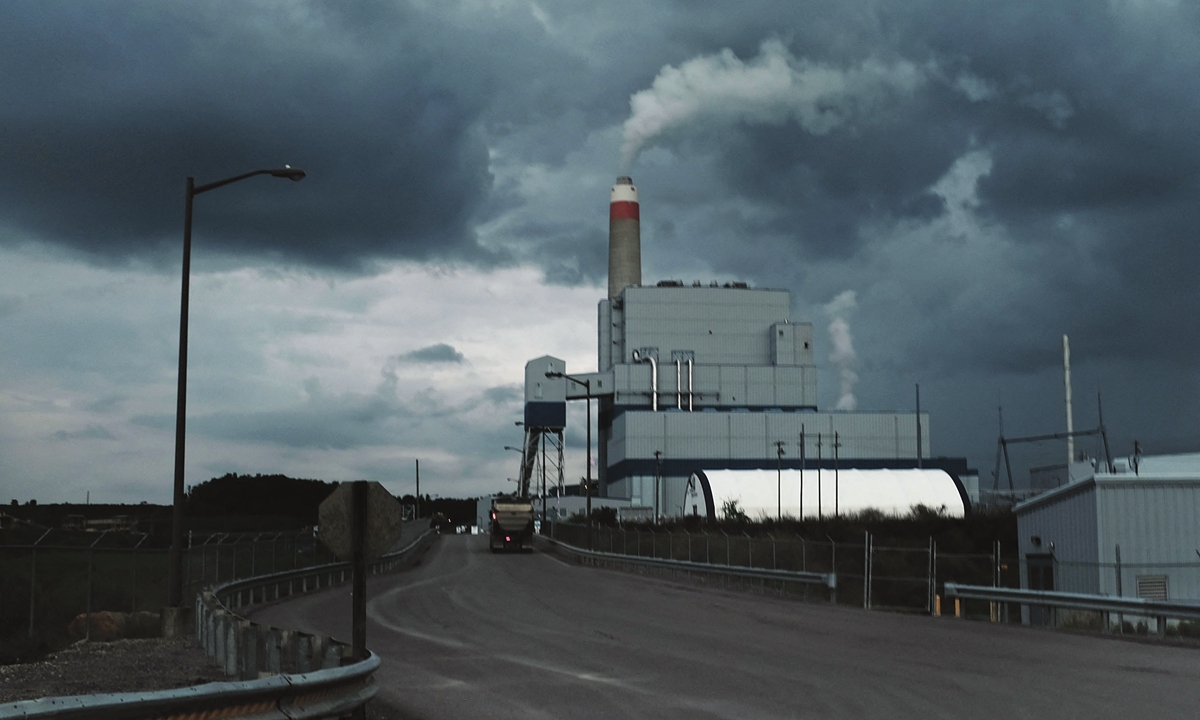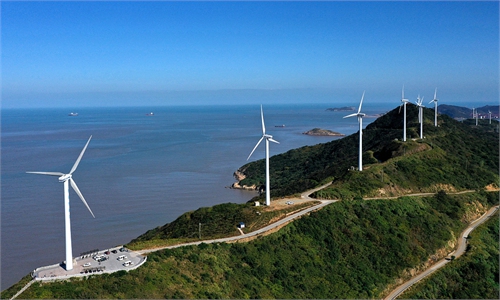High-carbon communities hope for Biden relief to ease the pain of a green shift
Just a transition
When Lacy Davidson Ferguson and her husband moved back to Wayne County in rural West Virginia to start a family about five years ago, they ran smack dab into an economic catastrophe.

"The Wayne lumber plant closed and other businesses that supported that industry and student enrollment started to decline," Davidson Ferguson, 33, told Reuters by phone. "That's when this shift really started."
It is a shift being felt in communities across the US that have long relied on the fossil fuel industry for growth, as policymakers adopt cleaner energy to tackle climate change.
Scattered local and state efforts have sought to ease the pain, aiming at what some call a "just transition." But now there is rising optimism that new US President Joe Biden's administration is preparing to bring unprecedented federal attention to the issue. "We're at an inflection point," said Jason Walsh, who was part of the federal government's only previous concerted push for a just transition, under former president Barack Obama, though Walsh called that program "ad hoc."
Sustained federal support has been a missing ingredient, said Walsh, now executive director of the BlueGreen Alliance, a coalition of labor and environmental groups. But the idea of seeking a just transition remains controversial, with some seeing it as an ineffectual cover for a green agenda, while laborers fear new jobs could pay far worse.
"We are very concerned about public policy that invests in renewable energy without provisions to ensure that workers earn good family-supporting wages with benefits," said Terry O'Sullivan, general president of the LIUNA labor union, whose members build and maintain energy facilities. Needs in communities undergoing an energy shift are huge, encompassing not just workers but also big investments to rebuild economies that once depended on the fossil fuel sector.
'Coming tsunami'
In the US, the conversation around a just transition began about a decade ago, focused on coal communities, said Devashree Saha, a senior associate with the World Resources Institute, a think tank. The scope has expanded only recently to all carbon-intensive industries such as oil and gas, and the auto sector, she said.
"We haven't even solved the just transition issue around coal communities - and now we are looking at an even bigger scale of challenge," she said. "It's like a coming tsunami."
The US has lagged behind other countries such as Canada, Germany, and Spain on the issue.
Biden campaigned on directly addressing the problem, and within days of taking office set up an inter-agency working group and pledged to funnel 40 percent of green energy investments to disadvantaged communities.
He also promised strong climate action and has rescinded approval for a contentious oil pipeline, affecting thousands of jobs and sparking anger among workers.
Such reactions underscore the balancing act facing Biden in enacting potentially politically polarizing energy and climate policy, said Wesley Look, a senior researcher with Resources for the Future, a Washington think tank.
'Marshall Plan'
Some groups have been preparing for this moment for years, said Heidi Binko, executive director of the Just Transition Fund. It spearheaded the National Economic Transition Platform, published in June, an effort by dozens of labor, green, and development groups outlining common needs across fossil fuel communities and key government actions to address them.
In the multi-state Ohio River Valley, local officials in November banded together under a framework called the "Marshall Plan for Middle America" - a reference to the rebuilding of Western Europe after World War II.
Led by Pittsburgh Mayor William Peduto, it lays out a vision of regional cooperation that would include $60 billion a year in investment for a decade to revitalize an area set to lose 100,000 energy jobs. The new plan, which seeks to create more than 400,000 jobs "for the first time says as a region that we need to make this transition include everyone," he added.
Biden will next week travel to Pittsburgh, a city with a long union history, to unveil a multi trillion dollar plan to rebuild America's infrastructure, while also tackling climate change and issues like income equality.
Hard to replace
Still, getting ahead of local economic upheaval is not always possible, experts told Reuters.
The remote towns of Colorado's "West End" region grew up around a coal-fired power plant constructed in the 1960s that was supposed to close in 2021 but instead shut two years early, with just six months' notice.
"It was huge in our community. Those 76 jobs were the best-paying jobs in the community and very difficult to replace," said Deana Sheriff, executive director of the West End Economic Development Corporation. But local communities rallied, pooling government and philanthropic money to hire a Sheriff to jump-start a transition, while also seeking to backfill wages as workers transitioned from one job to another. Today the area is doing surprisingly well, Sheriff said. About a third of the workers moved to other cities to stay with power plant company Tri-State, another dozen or so retired, and the rest bought existing businesses or created new ones. But authorities are struggling to fill holes in the local tax base, which the plant closure reduced by more than half.
Post-coal opportunities
In West Virginia, Davidson Ferguson and her husband are playing their part in local economic redevelopment by jump-starting a nascent organic farming movement.
They raise livestock and grow herbs, mushrooms, and more on 800 acres.

The Longview Power Plant, a coal-fired plant, stands on August 21, 2018 in Maidsville, West Virginia, the US. Photo: AFP
Much of the state was already in economic decline as demand for a key export - coal - dried up as a result of shifts to greener energy. And after a key freight train stopped running to the area, the fallout spread."The Wayne lumber plant closed and other businesses that supported that industry and student enrollment started to decline," Davidson Ferguson, 33, told Reuters by phone. "That's when this shift really started."
It is a shift being felt in communities across the US that have long relied on the fossil fuel industry for growth, as policymakers adopt cleaner energy to tackle climate change.
Scattered local and state efforts have sought to ease the pain, aiming at what some call a "just transition." But now there is rising optimism that new US President Joe Biden's administration is preparing to bring unprecedented federal attention to the issue. "We're at an inflection point," said Jason Walsh, who was part of the federal government's only previous concerted push for a just transition, under former president Barack Obama, though Walsh called that program "ad hoc."
Sustained federal support has been a missing ingredient, said Walsh, now executive director of the BlueGreen Alliance, a coalition of labor and environmental groups. But the idea of seeking a just transition remains controversial, with some seeing it as an ineffectual cover for a green agenda, while laborers fear new jobs could pay far worse.
"We are very concerned about public policy that invests in renewable energy without provisions to ensure that workers earn good family-supporting wages with benefits," said Terry O'Sullivan, general president of the LIUNA labor union, whose members build and maintain energy facilities. Needs in communities undergoing an energy shift are huge, encompassing not just workers but also big investments to rebuild economies that once depended on the fossil fuel sector.
'Coming tsunami'
In the US, the conversation around a just transition began about a decade ago, focused on coal communities, said Devashree Saha, a senior associate with the World Resources Institute, a think tank. The scope has expanded only recently to all carbon-intensive industries such as oil and gas, and the auto sector, she said.
"We haven't even solved the just transition issue around coal communities - and now we are looking at an even bigger scale of challenge," she said. "It's like a coming tsunami."
The US has lagged behind other countries such as Canada, Germany, and Spain on the issue.
Biden campaigned on directly addressing the problem, and within days of taking office set up an inter-agency working group and pledged to funnel 40 percent of green energy investments to disadvantaged communities.
He also promised strong climate action and has rescinded approval for a contentious oil pipeline, affecting thousands of jobs and sparking anger among workers.
Such reactions underscore the balancing act facing Biden in enacting potentially politically polarizing energy and climate policy, said Wesley Look, a senior researcher with Resources for the Future, a Washington think tank.
'Marshall Plan'
Some groups have been preparing for this moment for years, said Heidi Binko, executive director of the Just Transition Fund. It spearheaded the National Economic Transition Platform, published in June, an effort by dozens of labor, green, and development groups outlining common needs across fossil fuel communities and key government actions to address them.
In the multi-state Ohio River Valley, local officials in November banded together under a framework called the "Marshall Plan for Middle America" - a reference to the rebuilding of Western Europe after World War II.
Led by Pittsburgh Mayor William Peduto, it lays out a vision of regional cooperation that would include $60 billion a year in investment for a decade to revitalize an area set to lose 100,000 energy jobs. The new plan, which seeks to create more than 400,000 jobs "for the first time says as a region that we need to make this transition include everyone," he added.
Biden will next week travel to Pittsburgh, a city with a long union history, to unveil a multi trillion dollar plan to rebuild America's infrastructure, while also tackling climate change and issues like income equality.
Hard to replace
Still, getting ahead of local economic upheaval is not always possible, experts told Reuters.
The remote towns of Colorado's "West End" region grew up around a coal-fired power plant constructed in the 1960s that was supposed to close in 2021 but instead shut two years early, with just six months' notice.
"It was huge in our community. Those 76 jobs were the best-paying jobs in the community and very difficult to replace," said Deana Sheriff, executive director of the West End Economic Development Corporation. But local communities rallied, pooling government and philanthropic money to hire a Sheriff to jump-start a transition, while also seeking to backfill wages as workers transitioned from one job to another. Today the area is doing surprisingly well, Sheriff said. About a third of the workers moved to other cities to stay with power plant company Tri-State, another dozen or so retired, and the rest bought existing businesses or created new ones. But authorities are struggling to fill holes in the local tax base, which the plant closure reduced by more than half.
Post-coal opportunities
In West Virginia, Davidson Ferguson and her husband are playing their part in local economic redevelopment by jump-starting a nascent organic farming movement.
They raise livestock and grow herbs, mushrooms, and more on 800 acres.



